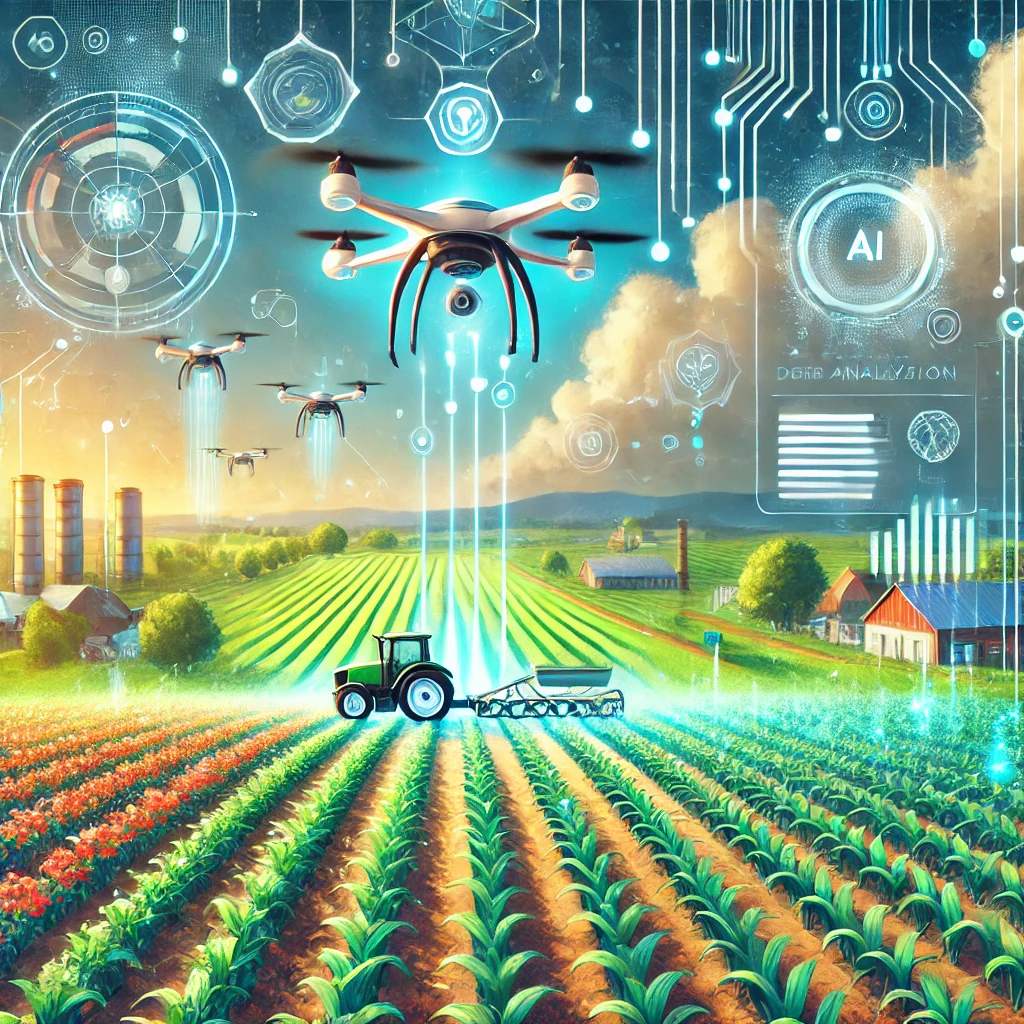AI in Agriculture: Boosting Crop Yields and Reducing Waste

Agriculture, the backbone of many economies, faces unprecedented challenges in the modern era. From climate change to increasing global demand for food, the industry is under immense pressure to innovate. Therefore, Artificial Intelligence (AI) has emerged as a game-changer, revolutionizing traditional farming practices. By leveraging cutting-edge technology, AI is helping farmers maximize crop yields, minimize waste, and secure a sustainable future. In this blog, we’ll explore how AI is transforming agriculture and why it’s the future of farming.
Why AI in Agriculture is a Game-Changer
Artificial Intelligence offers precision, efficiency, and scalability, addressing the key challenges in agriculture. To begin with, AI tackles:
- Climate Unpredictability: AI tools analyze weather patterns, helping farmers make informed decisions.
- Resource Optimization: AI-driven solutions ensure efficient use of water, fertilizers, and pesticides.
- Food Security: By increasing productivity, AI contributes to global food sustainability.
Clearly, these benefits make AI indispensable for modern farming.
Real-World Applications of AI in Agriculture
1. Precision Farming
First and foremost, precision farming uses AI to analyze soil quality, crop health, and weather conditions. Sensors and drones equipped with AI monitor fields in real-time. Consequently, farmers can:
- Detect pest infestations early.
- Assess crop health through aerial imaging.
- Optimize irrigation based on soil moisture levels.
Learn more about precision farming tools here.
2. Automated Irrigation Systems
Moreover, smart irrigation systems powered by AI ensure optimal water usage. By analyzing weather forecasts and soil data, these systems:
- Prevent over-irrigation and under-irrigation.
- Reduce water wastage by up to 30%.
Discover the latest in smart irrigation technology. Click here to explore.
3. Crop Yield Prediction
In addition, AI-powered algorithms process historical and real-time data to predict crop yields accurately. This helps farmers:
- Plan harvests effectively.
- Reduce post-harvest losses.
- Enhance supply chain efficiency.
Want to know how yield prediction works? Check this out!
4. AI-Powered Drones
Finally, drones equipped with machine learning algorithms play a crucial role. For instance, they:
- Monitor large fields quickly.
- Capture high-resolution images for crop analysis.
- Identify problem areas like nutrient deficiencies or pest hotspots.
Read about drone applications in agriculture. Learn more here.
Benefits of AI in Agriculture
1. Boosting Productivity
AI enables farmers to achieve higher yields by providing actionable insights. As a result, their output improves significantly.
2. Reducing Waste
Smart farming techniques reduce wastage of resources like water, seeds, and fertilizers. Thus, farming becomes more sustainable.
3. Sustainability
AI-driven farming minimizes environmental impact by optimizing resource usage and reducing chemical dependency. Consequently, this approach benefits the planet.
4. Cost Efficiency
Although AI systems require an initial investment, the long-term cost savings are substantial. Therefore, farmers find these tools worthwhile in the long run.
The Future of AI in Agriculture
As AI technology advances, its applications in agriculture will only grow. For example, upcoming trends include:
- Autonomous Tractors: Self-driving tractors to plow, sow, and harvest.
- Blockchain Integration: Enhancing transparency in the food supply chain.
- AI Marketplaces: Platforms connecting farmers with AI tools tailored to their needs.
Undoubtedly, these innovations will redefine the farming landscape.
Final Thoughts: Embrace the AI Revolution
The integration of AI into agriculture is not just an option; it’s a necessity for a sustainable future. By adopting AI-powered solutions, farmers can meet growing food demands while preserving the planet’s resources. Therefore, if you’re ready to take your farming practices to the next level, start exploring AI tools today!
For more insights on AI in agriculture and the latest technologies, subscribe to our newsletter.
Frequently Asked Questions
Q1: Is AI expensive for small farmers? While initial costs can be high, many affordable AI solutions are now available for small-scale farmers. Moreover, government subsidies and loans can also help.
Q2: How can I start using AI in my farm? Begin with tools like smart sensors or AI-based crop monitoring apps. Gradually, scale as you see results.
Q3: Are there risks associated with AI in farming? Like any technology, AI has challenges such as data security and dependence on technology. However, its benefits outweigh the risks when implemented correctly.
previous article: https://boostaiq.com/best-ai-tools-for-freelancers-to-skyrocket-productivity-in-2024/

I must say this article is extremely well written, insightful, and packed with valuable knowledge that shows the author’s deep expertise on the subject, and I truly appreciate the time and effort that has gone into creating such high-quality content because it is not only helpful but also inspiring for readers like me who are always looking for trustworthy resources online. Keep up the good work and write more. i am a follower.
Hi my loved one I wish to say that this post is amazing nice written and include approximately all vital infos Id like to peer more posts like this